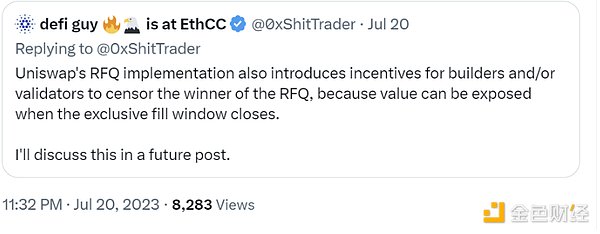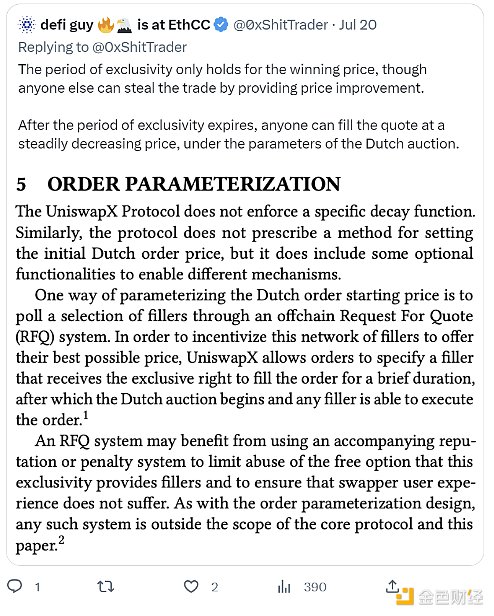Author: 0xShitTrader, co-founder of Ellipsis Labs; Translator: LianGuaixiaozou
Uniswap traders have created a significant amount of harmful MEV – losing up to $3 million per day due to sandwich attacks. UniswapX aims to solve this problem by replacing original transactions with intents submitted to Uniswap’s central servers. This solves the sandwich attack problem but also creates an MEV scrutiny issue.

First, let’s review how UniswapX, introduced by Uniswap, operates. A swapper requests quotes from the Uniswap frontend. A group of authorized quoters submit quotes to Uniswap’s central servers, which then return the winning quote to the frontend. To accept this quote, the swapper needs to sign a message and send it back to the Uniswap server. The winning quoter will have a brief window period (1 to 2 blocks) during which they have the privilege to fill the quote by including the transaction on-chain.
- Several practical use cases of ERC-6551
- Mint Ventures EDCON2023 Reflection – Revealing the Prospects of Infrastructure and Applications
- The three stages of the evolution of LSDfi liquidity staking protocol, LSD as collateral, diversified collateral.

During the time between the quote and the transaction, the fair price may favor the quoter. In this case, exclusive quoters are incentivized to fill the quote within the exclusive window period by including the transaction on-chain. However, this creates a motivation for validators to collude and scrutinize the transactions!
Suppose the profit brought by the quoter with the transaction is P. The exclusive window period passes through block N, and the exclusive quoter is trying to land the transaction on block N. The block producers of slots N and N+1 can collude to profit from P. By scrutinizing the transactions in block N and ending the exclusive quote window, the transaction with a profit of P will be open to everyone in block N+1.
Now we come to the standard bidding game phase, where the value P is sent to block producer N+1 instead of the previous exclusive quoter. The equilibrium state should be for block producer N to receive the largest share of profit P, and both the exclusive quoter and block producer N+1 should be willing to bid up to P-ε to include or scrutinize the winning transaction.
This type of attack seems unlikely to occur today. However, if some validators become powerful enough to frequently win consecutive blocks, or if the infrastructure for validator collusion is adopted, we may see the rampant growth of this MEV scrutiny issue.
A natural adjustment would be to extend the exclusive window to more blocks, making collusion more difficult and invalidating some game theory, especially in one-off trades.
Like what you're reading? Subscribe to our top stories.
We will continue to update Gambling Chain; if you have any questions or suggestions, please contact us!